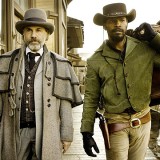
Django Unchained: Tarantino back in blaxploitation
Overview
Genre: Action, Drama, Western
Whoa
No
Bottom Line
Overly long and excessively violent, Quentin Tarantino’s Django Unchained isn’t as great of a movie as some critics make it out to be. And yet, Christoph Waltz’s performance is so terrific, it practically redeems a film. A veteran German-Austrian actor who won an Oscar for his role as the “Jew Hunter” in Tarantino’s previous effort, […]
0
Posted
December 25, 2012 by whopperjaw
Full Review













